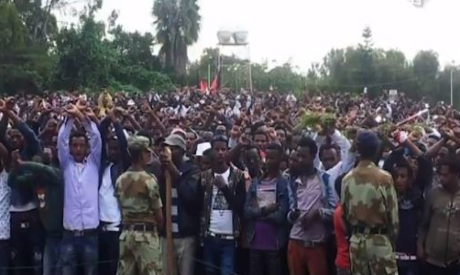
Ethiopians protest after the killing of Hachalu Hundessa, a popular singer from the Oromo ethnic group (Photo: Grab from video posted on the official Twitter account of HRW's Horn of Africa director Laetitia Bader @LaetitiaBader)
Opposition politicians and journalists caught up in recent mass arrests in Ethiopia have been denied access to lawyers while being held in conditions that make them vulnerable to the coronavirus, Human Rights Watch (HRW) said Saturday.
The allegations play into concerns that Prime Minister Abiy Ahmed, who won last year's Nobel Peace Prize in part for domestic political reforms, is embracing repressive measures to silence critics.
"The actions of Ethiopia's investigative authorities raise concerns that they have not moved on from past practices of arresting first, and investigating later," HRW's Horn of Africa director Laetitia Bader said in a statement.
"The authorities should promptly bring credible charges based on clear facts and evidence against the detainees or ensure their release."
More than 9,000 people have been rounded up in connection with violence that erupted in late June following the killing of Hachalu Hundessa, a popular singer from the Oromo ethnic group, leaving more than 200 people dead.
Among the detainees are high-profile opposition politicians and journalists from multiple outlets.
Investigations have so far "been marred by serious due process violations", with authorities failing to disclose the whereabouts of detainees and disregarding bail orders, HRW said.
At least two detainees -- a senior member of the opposition Oromo Federalist Congress and Kenyan journalist Yassin Juma -- have reportedly tested positive for COVID-19 while in custody.
"At a time when international and global experts are urging governments to reduce overcrowding in jails to tackle COVID-19, practices that lengthen the pretrial period are particularly problematic and ignore Ethiopia's own commitments," HRW said.
In a separate statement Friday, the Ethiopian Human Rights Commission, a government body, also warned that detainees could be exposed to COVID-19 in overcrowded prisons especially in the Oromia region, which surrounds the capital Addis Ababa.
Abiy's office and Ethiopia's attorney general did not immediately respond to requests for comment Saturday.
Abiy has repeatedly stressed that anyone involved in the violence in June and July would be held to account.
Short link: